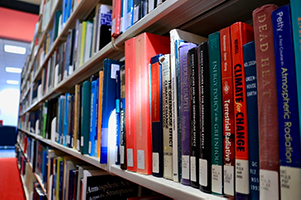The Clement and Linda McGillicuddy Humanities Center kicked off a new series of talks on climate change centered around Marilyn Sigman’s book “Entangled: People and Ecological Change in Alaska’s Kachemak Bay.” The event was organized and hosted over Zoom by Laura Cowan, a professor of English and the director of the Women’s, Gender, and Sexuality Studies Department at the University of Maine.
“Entangled” presents a personal narrative combined with reflections upon the rapidly shifting landscape of Alaska’s Kachemak Bay through the eyes of naturalist and wildlife management specialist Marilyn Sigman. The book, a small blue volume with images of marine life native to the area illustrated on its cover, contains a wealth of information on the region found on the Kenai Peninsula of Alaska. The work was published in 2018 and was awarded the John Burroughs Medal for Distinguished Natural History Book.
In this first of four total discussion groups, Cowan led attendants in a discussion of the first two sections of the book, entitled “Arrival” and “The Bidarki Story,” as an introduction to the concept of the “Shifting Baseline” which became the prominent focus of the discussion. There were brief introductions from Cowan, as well as from Sigman herself. Karen Siebar, a humanities specialist from the McGillicuddy Humanities Center, took time during these introductions to do a land acknowledgment, in which she acknowledged that this presentation was taking place on the land of the Penobscot Nation.
Sigman then presented a brief slideshow on her work and her connection to the Kachemak Bay region. She showed images of an overlook that marked the entrance into the town of Homer, as well as images of several beaches, and wildlife native to the region. Sigman discussed the concept of the “Shifting Baseline.” A baseline is defined scientifically as a minimum data point used for the sake of comparison, to discuss a “Shifting Baseline” is to discuss the way those data points have been drastically altered by the effects of climate change. Sigman also expands the concept of a “Shifting Baseline” to the cultural effects of climate change, and the ways in which life in Homer has been altered by the same problems facing their ecosystem.
“The water shape-shifts,” Sigman read an excerpt from the opening of her book “from bay to fog to cloud and back to the bay again as rain or snow… The 1964 earthquake caused the bottom of the bay to drop by six feet in ten minutes, and the entire planet rang like a gong.”
These moments she highlights from her book describe the ever changing nature of the Kachemak Bay region, and the ways in which the natural world shapes its people as much as the people shape it.
Sigman continued on to speak about her interactions with the natives of Homer, and the cultural significance of the Alutiiq potluck, and the various types of foods and fish she was able to eat. She notes that there is a great deal of importance to combining western science with traditional beliefs in order to form a more cohesive story of the land.
“Oftentimes western scientists go into research on species that indigenous peoples still rely upon and they tend to ignore that history,” Sigman said when asked to expand upon that idea in the brief Q and A session that followed her presentation. “It’s not always that scientists take the time to acknowledge the bigger stories.”
The discussion then was broken down into breakout sessions of five or six people, where they were asked to reflect upon their own experiences with a sense of place, and how climate change may have disrupted or shifted their individual baselines. Many people discussed that their sense of place had been altered in negative ways by the lengthening of the growing season in Alaska, invasive species of plants growing for longer periods of the year and droughts affecting various areas of Maine.
As the whole group reconvened at the end of the discussion, people agreed that there has been a lack of normality in recent years due to these adverse effects of climate change. One constant in these discussions was the idea of how a place is shaped by its people, and how one’s sense of belonging truly depends on the community. Despite these changes and shifts, there is still some hope to be found in sharing a respect for the land with your fellow man.
The next discussion in the series is taking place on Feb. 25 at 4 p.m. over Zoom. “Entangled: People and Ecological Change in Alaska’s Kachemak Bay” is available to purchase at the university bookstore. For more information, or to register for the reading group, visit the McGillicuddy Humanities Center website.








